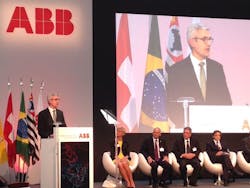With a presence in Brazil for more than 100 years, ABB inaugurated its fifth factory recently in the growing South American economy. The new greenfield plant in Sorocaba is part of a $200 million expansion plan to serve increasing domestic demand from industries such as petrochemicals, pulp and paper, oil and gas, and mining, as well as energy.
The plant began operating in the second half of last year. It will be used to, for the first time, assemble in one location compact power substations, and will also manufacture motors, generators, drive systems, measurement equipment and low-voltage products.
“ABB is extremely proud of this new state-of-the-art facility, which demonstrates once again our long-term commitment to Brazil,” said Ulrich Spiesshofer, ABB’s CEO. “As one of the world’s leading economies, Brazil is a key market for ABB. We are very pleased to continue to support Brazil’s economic growth through infrastructure and industrialization projects.”
Brazil is boosting industrial production and power capacity, and enhancing its transmission and distribution infrastructure to meet the needs of its expanding economy as well as for the 2014 FIFA World Cup and the 2016 Olympic Games.
With its new factory, ABB aims to be a one-stop shop for Brazilian customers’ electrical equipment needs, engineering, designing, assembling, packaging, testing and delivering equipment, including switchgear, drives, periphery distribution equipment and automation systems, as well as managing the assembly of compact substations.
The factory also has service workshops to help customers with maintenance and repair of motors, and a repair and test workshop for analyzers and instruments. The plant complies with international standards and sustainable development requirements: It is highly energy-efficient, makes optimum use of natural light, and recycles waste and water.
ABB’s history in Brazil began more than a century ago with the supply of electrical equipment for the first Sugar Loaf cable car in Rio de Janeiro in 1912. ABB Brazil employs about 4,500 staff and has had factories in the country since the 1950s. It has been a key supplier to most of Brazil’s main infrastructure and industrialization projects, including the Itaipu hydro plant and transmission line, which provides 20 percent of Brazil’s electrical power.
Leaders relevant to this article:

